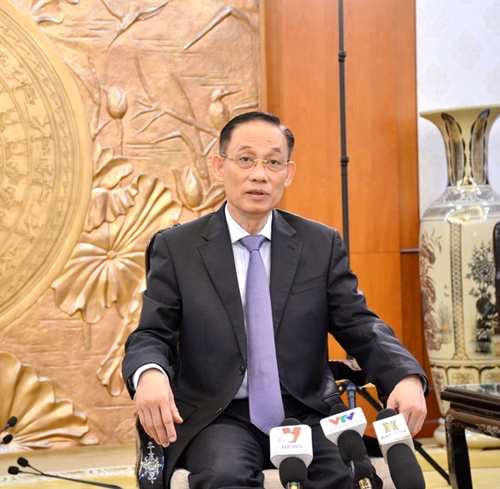In an interview granted to reporters, Trung emphasized that the outcomes of the visit will help orient and bring the great friendship, special solidarity, and comprehensive cooperation between Vietnam and Laos into a new closer, deeper, and more effective development phase.
During the visit to Vietnam, Party General Secretary and President Thongloun Sisoulith, his spouse, and the senior delegation from the Party and State of Laos engaged in a series of activities, including official state welcoming ceremony and talks with his Vietnamese counterpart To Lam; meetings with Prime Minister Pham Minh Chinh and National Assembly Chairman Tran Thanh Man. The Lao leader also co-chaired a high-level meeting between the two parties; met with the Central Committee of the Vietnam Fatherland Front and the Vietnam-Laos Friendship Association, and attended a banquet hosted by General Secretary and President To Lam and his spouse.
    |
 |
|
Head of the Party Central Committee's Commission for External Relations Le Hoai Trung |
The Lao delegates also laid wreaths at the Mausoleum of President Ho Chi Minh and the Monument of Heroic Martyrs; visited and worked with Ho Chi Minh City; met with former Party General Secretary Nong Duc Manh, former President Nguyen Minh Triet, and former President Truong Tan Sang. The Lao General Secretary and President also had a meeting with former Vietnamese volunteer soldiers, advisors, Lao students in Vietnam, and the young generations of both countries. Additionally, General Secretary and President To Lam’s spouse and his Lao counterpart’s visited an orphanage center in Hanoi and organized a Mid-Autumn Festival for the children.
At the talks between the two party general secretaries and state presidents and meetings between the Lao leader and Vietnamese key leaders, the two sides updated each other on their party and country’s situation, exchanged views on international and regional situations, assessed the outcomes of past cooperation, and set orientation for future collaboration in various fields. These exchanges taking place in a warm atmosphere, filled with close comradeship, have helped further strengthen the mutual understanding and the special friendship between the two general secretaries and presidents and among senior leaders of both countries.
The Head of the Party Central Committee's Commission for External Relations added that the two top leaders reaffirmed the great significance of the Vietnam-Laos relationship. They emphasized that the great friendship, special solidarity, and comprehensive cooperation is an invaluable shared asset of the two nations. Both sides reaffirmed their mutual respect and special priority to each other and to the Vietnam-Laos relationship, agreeing to continue nurturing and advancing the relationship between the two parties, states, and peoples to a new height. A joint Vietnam-Laos declaration was also issued.
Trung emphasized that it is crucial to effectively implement cooperation and relationship development orientations reached by leaders of the two countries in the coming time. He said that to achieve that goal, first, agencies at all levels, sectors, and localities must fully grasp the significance and special value of the Vietnam-Laos relationship, as well as the vital importance of unity and mutual assistance in each other’s the cause of national construction and defense.
Trung added that the two sides should pay attention to effectively implementing reached agreements and commitments, including programs on cooperation in economic, trade, investment, infrastructure, and financial connectivity. This is the general spirit that has been emphasized in Vietnam’s foreign relations recently and requires strong determination, pro-activeness, and creativity from agencies at all levels, sectors, and localities to quickly bring the agreements and commitments into life.
Third, the two general secretaries and presidents, along with senior leaders from both sides, have outlined key directions and measures to promote cooperation in various fields. Relevant ministries, sectors, and localities must soon develop programs and action plans for each issue and area, with specific timelines and steps.
The fourth and last important one is that relevant agencies should strengthen coordination to promptly address challenges and obstacles, accelerate progress in implementation, and regularly monitor and review progress to ensure effective implementation of the agreements, commitments, and cooperation programs between the two countries.
Translated by Tran Hoai